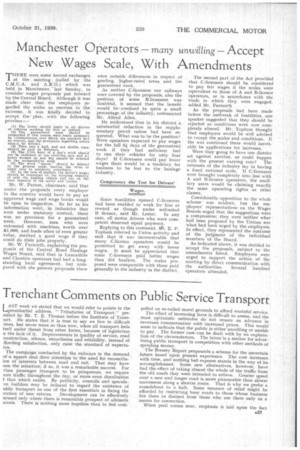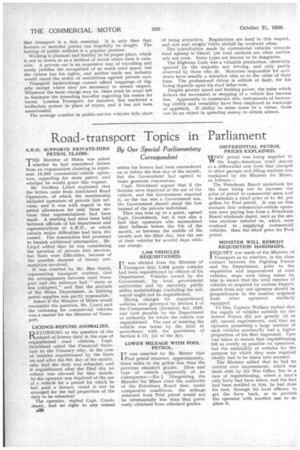Trenchant Comments on Public Service Transport
Page 29

Page 30

If you've noticed an error in this article please click here to report it so we can fix it.
AST week we stated that we would refer to points in the Ldpresidential address, "Tributaries of Transport," prelented by Mr. T. E. Thomas before the Institute of Trans)ort. He states that it is true to say we live in difficult imes, but never more so than now, when all transport feels tself under threat from other forms, because of legislation w the lack of it. Improvements in quality of service, road onstruction, silence, smoothness and reliability, instead of .ffording satisfaction, only raise the standard of expecteion.
The campaign 'conducted by the railways in the demand or-a square deal, drew attention to the need for reconciliaion of interests between road and rail. That may have een the intention; if so. it was a. remarkable success. For rban passenger transport to be prosperous, we require lore traffic throughout the day, or mom even distribution f that which exists. By publicity, councils and speculaye builders may be induced to regard the existence of ublic transport as one of the first essentials in fixing the ication of new estates. Development can be effectively ursued only where there is reasonable prospect of ultimate Iccess. There is nothing more hopeless than to feel coin
pelled on so-called moral grounds to afford wasteful service. The effect of increasing fares is difficult to assess, and the most optimistic estimates do not ensure an advance in revenues commensurate with increased prices. This would seem to indicate that the public is either unwilling or unable to pay. The former case can be dealt with by an explanation of the circumstances. The latter is a matter for advertising public transport in competition with other methods of spending money.
Bressey Report propounds a scheme for the uncertain future based upon present experience. The cost increases with time, and nothing but expense stands in the way of its accomplishment. Some new alternatives, however, have had the effect of taking almost the whole of the traffic from the old roads they were intended to relieve. Greater speed over a new and longer road is. more pleasurable than slower movement along a shorter route. That is why we prefer a roundabout to a halt. Some measure of relief might be afforded by restricting busy roads to those whose business lies there as distinct from those who use them only as a means for connection.
When peril comes near, emphasis is laid upon the fact 427 that transport is a first essential. It is only then that favours or merciful justice can hopefully be Sought. The baiting of public utilities is a popular pastime.
Walking is pleasant and healthy in its proper place, which is not in towns or as a method of travel where time is valuable. A private car is an expensive way of travelling and rarely justifies the occupation of so much road space; but the citizen has his rights, and neither trade nor industry would stand the strain of restrictions against private cars.
Transport undertakings cannot afford trappings of dignity except where they are necessary to ensure respect. Whatever the basic charge may be, there must be scope left to fascinate the intending traveller regarding his means for travel. London Transport, for instance, has marketed a trolleybus system in place of trams, and it has not been unsuccessful.
The average comfort in public-service vehicles falls short • of being attractive. Regulations are hard in this respect, and size and weight lin:tits shciiild be reviewed often.
The contribution made by commercial vehicles towards road upkeep is liberal, yet road surfaces are often neither safe nor even. Some types are known to be dangerous.
The Highway Code was a valuable production, cheerfully ignored by the majority not driving, and only partly observed by those who do. Motorists responsible for accidents have usually a mistaken idea as to the value of their • time. The professional driver is seldom at fault, for his living depends upon his road behaviour.
Despite greater speed and braking power, the noise which follows the movement or stopping of a vehicle has become less. Apparently to counteract this, instruments of increasing virility and versatility have been employed as warnings of apprbach. If ability to make noise be a virtue, there can be no object in spending money to obtain silence.




















































